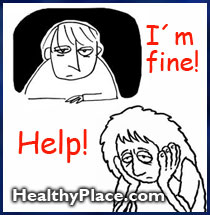 Depression is an illness that affects both men and women. But people working in mental health services see far fewer men with depression than women with depression. It seems likely that men suffer from depression just as often as women, but that they are less likely to ask for help. Depression is easily treatable and best treated as early as possible. Men need to know what it is and how to get effective help.
Depression is an illness that affects both men and women. But people working in mental health services see far fewer men with depression than women with depression. It seems likely that men suffer from depression just as often as women, but that they are less likely to ask for help. Depression is easily treatable and best treated as early as possible. Men need to know what it is and how to get effective help.
It's Different For Men
The way that men think about themselves can be quite unhelpful. Compared with women, they tend to be far more concerned with being competitive, powerful and successful. Most men don't like to admit that they feel fragile or vulnerable, and so are less likely to talk about their feelings with their friends, loved ones or their doctors. This may be the reason that they often don't ask for help when they become depressed. Men tend to feel that they should rely only on themselves and that it is somehow weak to have to depend on someone else, even for a short time.
This traditional view of how men should be - always tough and self-reliant - is also held by some women. Some men find that owning up to their depression actually results in their partner rejecting them because of this. Even professionals sometimes share this view, and may not diagnose depression in men when they should.
Symptoms of Depression
- Feeling sad or unhappy
- High levels of anxiety
- Low energy
- Difficulties concentrating
- Feeling worthless or hopeless
- Losing interest in activities or people
- Weight loss
- Loss of appetite
- Loss of sex drive
- Lapses in personal hygiene, such as not bathing or shaving as regularly
- Thoughts of suicide
The symptoms for some types of depression may also include extreme opposites of those listed above for example, unusually high or prolonged levels of energy, significant weight gain and so on.
Other people may notice that:
- You are performing less well at work
- You seem unusually quiet, unable to talk about things
- You're worrying about things more than usual
- You're more irritable than usual
- You're complaining more about vague physical problems
How Do Men Cope
Instead of talking about how they feel, men may try to make themselves feel better by using alcohol or drugs. This will usually make things worse in the long run. Their work will suffer and alcohol often leads to irresponsible, unpleasant or dangerous behavior. Men also tend to give their work a higher priority than their home life, which produces conflicts with their wives or partners. All of these things have been shown to make depression more likely.
Relationships
 For married men, research has shown that trouble in a marriage is the most common single problem connected with depression. Men can't cope with disagreements as well as women. Arguments actually make men feel very physically uncomfortable. So, they try to avoid arguments or difficult discussions. This often leads to the situation where a man's partner will want to talk about a problem, but he will not and will do his best to avoid talking about it. The partner feels that they are being ignored and tries to talk about it more, which makes him feel he is being nagged. So, he withdraws even more, which makes his partner feel even more that they are being ignored . . . and so on. This vicious circle can quite easily destroy a relationship.
For married men, research has shown that trouble in a marriage is the most common single problem connected with depression. Men can't cope with disagreements as well as women. Arguments actually make men feel very physically uncomfortable. So, they try to avoid arguments or difficult discussions. This often leads to the situation where a man's partner will want to talk about a problem, but he will not and will do his best to avoid talking about it. The partner feels that they are being ignored and tries to talk about it more, which makes him feel he is being nagged. So, he withdraws even more, which makes his partner feel even more that they are being ignored . . . and so on. This vicious circle can quite easily destroy a relationship.
Separation and Divorce
Men have traditionally seen themselves as being the leaders in their family lives. However, the process of separation and divorce is most often started by women. Of all men, those who are divorced are most likely to kill themselves, probably because depression is more common and more severe in this group. This may be because, as well as losing their main relationship, they often lose touch with their children, may have to move to live in a different place, and often find themselves hard-up for money. These are stressful events in themselves, quite apart from the stress of the break-up, and are likely to bring on depression.
Sex
Depressed men feel less good about their bodies and less sexy than when they're not depressed. Many just go off sex completely. Several recent studies suggest that, in spite of this, men who are depressed have intercourse just as often, but they don't feel as satisfied as usual. A few depressed men actually report increased sexual drive and intercourse, possibly as a way of trying to make themselves feel better. Another problem may be that some antidepressant drugs will also reduce sex-drive in a small number of men who take them.
HOWEVER, the good news is that, as the depression improves, so will your sexual desire, performance and satisfaction.
It's worth remembering that it can happen the other way round. Impotence (difficulty in getting or keeping an erection) can bring about depression. Again, this is a problem for which it is usually possible to find effective help.
Pregnancy and Children
We have known for many years that some mothers feel severely depressed after having a child. It is only recently that we have realized that more than 1 in 10 fathers also suffer psychological problems during this time. This shouldn't really be surprising. We know that major events in people's lives, even good ones like moving house, can bring about a period of depression. And this particular event changes your life more than any other. Suddenly, you have to spend much more of your time looking after your partner, and the children.
On an intimate level, new mothers tend to be less interested in sex for a number of months. Simple tiredness is the main problem, although you may take it personally and feel that you are being rejected. You may have to adjust, perhaps for the first time, to taking second place in your partner's affections. You will also probably find that you have to spend less time at work. Paternity leave is still quite unusual in the most parts of the world.
New fathers are more likely to become depressed if their partner is depressed, if they aren't getting along with their partner, or if they are unemployed. This isn't important just from the father's point of view. It will affect the mother and may have an important impact on how the baby grows and develops in the first few months.
Unemployment and Retirement
 Leaving work, for any reason, can be stressful. Recent work has shown that up to 1 in 7 men who become unemployed will develop a depressive illness in the next 6 months. This is much more than would be expected in employed men. In fact, after relationship difficulties, unemployment is the most likely thing to push a man into a bad depression. This isn't surprising, as work is often the main thing that gives a man his sense of worth and self-esteem. You may lose symbols of your success, such as the company car. You may have to adjust to looking after the home and children, while your wife or partner becomes the bread-winner. From a position of being in control, you may face a future over which you have little control, especially if it takes a long time to find another job.
Leaving work, for any reason, can be stressful. Recent work has shown that up to 1 in 7 men who become unemployed will develop a depressive illness in the next 6 months. This is much more than would be expected in employed men. In fact, after relationship difficulties, unemployment is the most likely thing to push a man into a bad depression. This isn't surprising, as work is often the main thing that gives a man his sense of worth and self-esteem. You may lose symbols of your success, such as the company car. You may have to adjust to looking after the home and children, while your wife or partner becomes the bread-winner. From a position of being in control, you may face a future over which you have little control, especially if it takes a long time to find another job.
It is more likely to happen if you are shy, if you don't have a close relationship or if you don't manage to find another job. Of course, if you get depressed, you may well find it harder to get another job, which may make your depression worse.
Retiring from paid employment can be difficult for many men, especially if their partner continues to work. It may take some time to get used to losing the structure of your day and contact with workmates.
Gay Men and Depression
On the whole, gay men do not suffer from depression any more than straight men. However, it seems that gay teenagers and young adults are more likely to become depressed, possibly due to the stresses associated with coming out.
Suicide

Men are around 3 times more likely to kill themselves than women. Suicide is most common amongst men who are separated, widowed or divorced and is more likely if someone is a heavy drinker. Over the last few years, men have become more likely to kill themselves, particularly those aged between 16 and 24 years and those between 39 and 54 years. We don't yet know why this should be so, but it is very worrying.
We do know that 2 out of 3 people who kill themselves have seen their family doctor in the previous 4 weeks and nearly 1 in every 2 will have done so in the week before they kill themselves. We also know that about 2 out of 3 people who kill themselves will have talked about it to friends or family.
Asking if someone is feeling suicidal will not put the idea into his head or make it more likely that he will kill himself. So, although some men may not be very good at talking about how they are feeling, it is important to ask if you have any suspicion - and to take such ideas seriously. For a man who feels suicidal, there is nothing more demoralizing than to feel that others do not take him seriously. He will often have taken some time to pluck up the courage to tell anybody about it. If you do find yourself feeling so bad that you have thought about suicide, it can be a great relief to tell someone.
Violence
Some studies have shown that men who commit violent crimes are more likely to get depressed than men who don't. However, we don't know if the depression makes their violence more likely, or if it's just the way they lead their lives.
Helping Men
 Many men find it difficult to ask for help when they are depressed - it can feel unmanly and weak. It may be easier for men to ask for help if those who give that help take into account men's special needs.
Many men find it difficult to ask for help when they are depressed - it can feel unmanly and weak. It may be easier for men to ask for help if those who give that help take into account men's special needs.
Men who are depressed are more likely to talk about the physical symptoms of their depression rather than the emotional and psychological ones. This may be one reason why doctors sometimes don't diagnose it. If you are feeling wretched, don't hold back - tell your doctor.
It can help to be reminded that depression is a result of chemical changes in the brain. It is nothing to do with being weak or unmanly, and it can easily be helped. Antidepressant tablets are often an important part of getting better - and it's important to remember that this sort of medication is not addictive.
If a depressed man is married, or in a steady relationship, his partner should be involved so that she can understand what is happening. This will make it less likely for the depression to cause permanent problems in their relationship.
Some men don't feel comfortable talking about themselves and so may be reluctant to consider psychotherapy. However, it is a very powerful way of relieving depression and works well for many men.
Helping Yourself
Don't bottle things up - If you've had a major upset in your life, try to tell someone how you feel about it.
Keep Active - Get out of doors and get some exercise, even if it's only a walk. This will help to keep you physically fit and you will sleep better. It can also help you not to dwell unhelpfully on painful thoughts and feelings.
Eat properly - you may not feel very hungry, but you should eat a balanced diet, with lots of fruit and vegetables. It's easy to lose weight and run low on vitamins when you are depressed.
Avoid alcohol and drugs - Alcohol may make you feel better for a couple of hours, but it will make you more depressed in the long run. The same goes for street drugs, particularly amphetamines and ecstasy.
Don't get upset if you can't sleep - Do something restful that you enjoy, like listening to the radio or watching television.
Use relaxation techniques - If you feel tense all the time there are many ways of helping yourself to relax. These include exercises, audio-tapes, yoga, massage, aromatherapy etc.
Do something you enjoy - Set some time aside regularly each week to do something you really enjoy - exercise, reading, a hobby.
Check out your lifestyle - A lot of people who have depression are perfectionists and tend to drive themselves too hard. You may need to set yourself more realistic targets and reduce your workload.
Take a break - This may be easier said than done, but it can be really helpful to get away and out of your normal routine for a few days. Even a few hours can be helpful.
Read about depression - There are now many books about depression. They can help you to cope, but can also help friends and relatives to understand what you are going through.
Remember, in the long run, this might be helpful - It's unpleasant to have it, but depression can be a useful experience, and some people emerge stronger and coping better than before. You may see situations and relationships more clearly and may now have the strength and wisdom to make important decisions and changes that you were avoiding before.
Getting More Help
The best place to start is your general practitioner / family doctor. He or she will be able to assess you and to discuss the options for treatment with you. It is true that many men are concerned that the information held by their family doctors may need to be given in medical reports, and so may damage their chances in work. In spite of this, your family doctor is the best person to approach. Depression may be due to physical illness, so it is important that you have a proper physical check-up. If you are already receiving treatment for some physical disorder, your doctor will need to know because of the possible interactions between drugs. Any worries about confidentiality should be discussed with your doctor.
If you really feel that you can't talk about it with anyone you know, look in the phone book for a 24 hour telephone service (crisis line) which can give you the opportunity to discuss things anonymously.
Depression can be as much of an illness as pneumonia or breaking your leg. We really shouldn't feel embarrassed or ashamed about it. The most important thing to remember is to ask for the help you need, when you need it. If you need more information, or to talk to somebody confidentially, the following lists of publications and other organizations may be helpful.
Remember - depression is easily treatable and you are entitled to the help you need.
next: Treatments For Men With Depression
~ depression library articles
~ all articles on depression
 You cannot force someone to seek help, change their habits, or adjust their attitudes. You will make important progress in honestly sharing your concerns, providing support, and knowing where to go for more information!
You cannot force someone to seek help, change their habits, or adjust their attitudes. You will make important progress in honestly sharing your concerns, providing support, and knowing where to go for more information! JULIE A. FAST, author of
JULIE A. FAST, author of 
 Depression is an illness that affects both men and women. But people working in mental health services see far fewer men with depression than women with depression. It seems likely that men suffer from depression just as often as women, but that they are less likely to ask for help. Depression is easily treatable and best treated as early as possible. Men need to know what it is and how to get effective help.
Depression is an illness that affects both men and women. But people working in mental health services see far fewer men with depression than women with depression. It seems likely that men suffer from depression just as often as women, but that they are less likely to ask for help. Depression is easily treatable and best treated as early as possible. Men need to know what it is and how to get effective help. For married men, research has shown that trouble in a marriage is the most common single problem connected with depression. Men can't cope with disagreements as well as women. Arguments actually make men feel very physically uncomfortable. So, they try to avoid arguments or difficult discussions. This often leads to the situation where a man's partner will want to talk about a problem, but he will not and will do his best to avoid talking about it. The partner feels that they are being ignored and tries to talk about it more, which makes him feel he is being nagged. So, he withdraws even more, which makes his partner feel even more that they are being ignored . . . and so on. This vicious circle can quite easily destroy a relationship.
For married men, research has shown that trouble in a marriage is the most common single problem connected with depression. Men can't cope with disagreements as well as women. Arguments actually make men feel very physically uncomfortable. So, they try to avoid arguments or difficult discussions. This often leads to the situation where a man's partner will want to talk about a problem, but he will not and will do his best to avoid talking about it. The partner feels that they are being ignored and tries to talk about it more, which makes him feel he is being nagged. So, he withdraws even more, which makes his partner feel even more that they are being ignored . . . and so on. This vicious circle can quite easily destroy a relationship. Leaving work, for any reason, can be stressful. Recent work has shown that up to 1 in 7 men who become unemployed will develop a depressive illness in the next 6 months. This is much more than would be expected in employed men. In fact, after relationship difficulties, unemployment is the most likely thing to push a man into a bad depression. This isn't surprising, as work is often the main thing that gives a man his sense of worth and self-esteem. You may lose symbols of your success, such as the company car. You may have to adjust to looking after the home and children, while your wife or partner becomes the bread-winner. From a position of being in control, you may face a future over which you have little control, especially if it takes a long time to find another job.
Leaving work, for any reason, can be stressful. Recent work has shown that up to 1 in 7 men who become unemployed will develop a depressive illness in the next 6 months. This is much more than would be expected in employed men. In fact, after relationship difficulties, unemployment is the most likely thing to push a man into a bad depression. This isn't surprising, as work is often the main thing that gives a man his sense of worth and self-esteem. You may lose symbols of your success, such as the company car. You may have to adjust to looking after the home and children, while your wife or partner becomes the bread-winner. From a position of being in control, you may face a future over which you have little control, especially if it takes a long time to find another job.
 Many men find it difficult to ask for help when they are depressed - it can feel unmanly and weak. It may be easier for men to ask for help if those who give that help take into account men's special needs.
Many men find it difficult to ask for help when they are depressed - it can feel unmanly and weak. It may be easier for men to ask for help if those who give that help take into account men's special needs. Dear Diary,
Dear Diary,
 Effexor does not interact with Lithium or Valium. However, you should consult your doctor before combining Effexor with other drugs that affect the central nervous system, including narcotic painkillers, sleep aids, tranquilizers, antipsychotic medicines such as Haldol, and other antidepressants such as Tofranil.
Effexor does not interact with Lithium or Valium. However, you should consult your doctor before combining Effexor with other drugs that affect the central nervous system, including narcotic painkillers, sleep aids, tranquilizers, antipsychotic medicines such as Haldol, and other antidepressants such as Tofranil. The usual starting dose is 10 to 15 milligrams per 2.2 pounds of body weight per day. Your doctor may increase the dose at weekly intervals by 5 to 10 milligrams per 2.2 pounds per day until seizures are controlled or side effects become too severe. If stomach upset develops, the dose may be increased more slowly. The daily dose should not exceed 60 milligrams per 2.2 pounds per day.
The usual starting dose is 10 to 15 milligrams per 2.2 pounds of body weight per day. Your doctor may increase the dose at weekly intervals by 5 to 10 milligrams per 2.2 pounds per day until seizures are controlled or side effects become too severe. If stomach upset develops, the dose may be increased more slowly. The daily dose should not exceed 60 milligrams per 2.2 pounds per day.